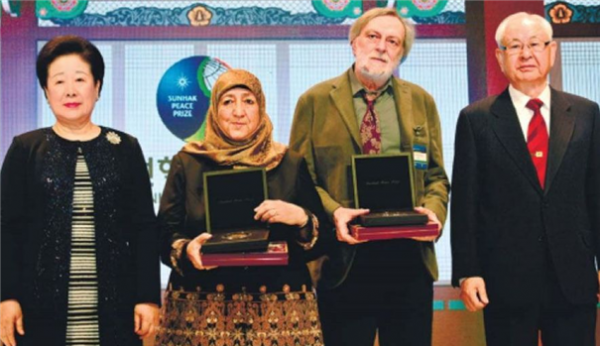
The Sunhak Peace Prize presentation was made by founder Dr. Hak Ja Han Moon, and Sunhak Committee Chair, Dr. Il Sik Hong, at the UPF World Summit with the International Association of Parliamentarians for Peace attended by 800 former and current members of parliament from 120 countries.
Dr. Gino Strada, 68, a surgeon who works on the front lines of war zones and in refugee camps, and Dr. Sakena Yacoobi, 66, an Afghan educator who teaches in resettlement camps in Afghanistan, were selected as co-recipients of the Sunhak Peace Prize at a ceremony in Seoul, Korea on Friday, March 3.
The Sunhak Peace Prize was founded in 2015 by Dr. Hak Ja Han Moon, widow of the Reverend Sun Myung Moon, who died in 2013. The Sunhak Peace Prize, awarded biannually, “honors individuals or organizations that have made enduring contributions to peace and human development for future generations,” according to the Sunhak Foundation which gives the award.
Dr. Strada is an Italian surgeon and founder of the NGO Emergency, recognized by the United Nations. Emergency has operated in theaters of war in thirteen countries, including Iraq, Afghanistan, Sudan, Sierra Leone, Cambodia, and the Central African Republic.
In the late 1980s and early-90s, as a heart surgeon with the International Committee of the Red Cross (ICRC), he worked in war zones in Pakistan, Ethiopia, Peru, Afghanistan, Somalia, and Bosnia. His field experience motivated him and a group of colleagues to found Emergency as an NGO. He said he wanted to create “a small, agile, highly specialized medical organization.” He wanted to be able to go into conflict areas quickly, bypassing the usual bureaucratic delays.
Today, Emergency operates eight surgical hospitals in areas of conflict in Africa and the Asian subcontinent. The organization has also established more than fifty first-aid health care centers near heavily mined areas, many of them in and around areas of active conflict.
In his acceptance remarks, Dr. Strada said, “Refugees often ask me, ‘what did I do wrong?’ That question always shocks me. The elimination of war or human conflict is the only practical solution to end human suffering, and it is the only practical solution to end human suffering.”
This year’s co-recipient, Dr. Sakena Yacoobi, is the CEO of the Afghan Institute of Learning, which she founded in 1995 in response to the lack of education and healthcare that the Afghan people were facing after decades of war and strife. Since its founding, the organization has either has worked at the grassroots level, establishing four schools, a hospital, and a radio station. Her work has a beneficial impact on the lives of millions of Afghans, especially with her work educating young girls and women. Her efforts have greatly reduced the infant mortality rate and the death rate of Afghan women and improved the illiteracy rate among Afghan women.
In her acceptance remarks, she said, “In 1979, all my family members became refugees in the war between the Soviet Union and Afghanistan. I know what deprived me of all my rights; I know what I have forfeited. For that reason, I must pass along this award to Afghan women and children today.”
Dr. Hong, who is the former president of Korea University, said, “As a prize founded on the vision for peace in recognition that the people of the world are one family under God, the committee elected to present the refugee crisis as its core theme for the 2017 awards.”
Chairman Hong, added, “Presently as we face the largest number of displaced persons on the global level since World War II, the international community must make a transnational effort for the common benefit of humankind.” He added, “In order to create a world of lasting peace, the award’s founder emphasized the love for humanity that transcends divisions of race, national borders, ideology, and religion.”
Chairman Hong asserted that “At a time when the global refugee crisis seems to be worsening by the day, these two laureates, who have devoted their lives to fundamentally rebuilding the lives of refugees through providing the most essential of our rights to ‘medical aid’ and ‘education,’ are the heroes of this era.”
The award ceremony, held in the Lotte World Hotel in Seoul, was attended by more than 800 delegates, including former President of Kiribati Anote Tong who gave a congratulatory address, saying, “The refugee crisis requires a global response, and therefore we must enhance the global effort through cooperation and coordination between all actors.”